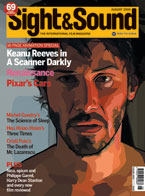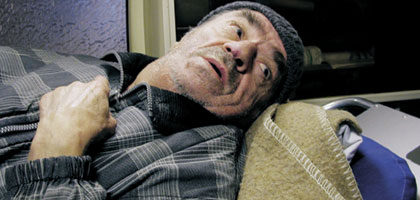Primary navigation

Romania 2005

Reviewed by Michael Brooke
Our synopses give away the plot in full, including surprise twists.
Bucharest, the present. Sixty-two-year-old Dante Remus Lazarescu rings the ambulance service to complain about a four-day headache. While tending to his cats, his symptoms worsen and he asks his neighbours, Sandu and Mihaela Sterian, if they have any painkillers. They lecture him about his drinking, but offer him food and keep him company until the ambulance arrives. Paramedics Mioara and Leo assess the situation and decide that Lazarescu needs hospitalisation. Mioara rings Lazarescu's sister, who cannot come until the following morning. Sandu and Mihaela are asked if one of them could go to the hospital, but they politely demur. Mioara and Leo drive Lazarescu to four different hospitals. In each, they encounter harassed staff trying to deal with the aftermath of a major traffic pile-up, who consequently have little time for Lazarescu and contrive excuses for not dealing with him; these range from the smell of alcohol on his breath to his inability to sign a consent form. The staff are more sympathetic at the final hospital, but Lazarescu's condition has deteriorated so much he has become incoherent.
He is prepared for surgery...
Though Romanian films have barely brushed against British cinema screens outside festivals, Cristi Puiu's second feature (after 2001's Stuff and Dough) needs no cultural adjustment whatsoever. It's easy to forget that it's set in Bucharest, so familiar will its situation and characters seem to British audiences, especially at a time when the National Health Service's shortcomings are rarely out of the headlines.
For all its length, the premise could hardly be simpler. Sixty-two-year-old Mr Lazarescu (Ioan Fiscuteanu) is taken ill and rings for an ambulance. It takes an hour to arrive (Puiu stages this in real time), and spends the next 90 minutes shuttling Lazarescu around four different hospitals, whose staff seem equally reluctant to get involved. The fallout from a major traffic accident provides significant mitigation, though it's clear from the medics' reaction to Lazarescu (who smells of alcohol, and produces more pungent aromas later on) that they're grateful to have such an excuse. Each visit involves the same cycle of registration, discussion of symptoms, routine blood-pressure checks and petty hierarchical squabbles as harassed staff attempt to assert their authority, with the only sympathetic constants being provided by paramedics Mioara and Leo (Luminita Gheorghiu and Gabriel Spahiu).
If that makes it sound like an extended episode of Casualty or ER (the last an acknowledged inspiration), The Death of Mr. Lazarescu also depicts as rich a human comedy, in the Balzacian sense, as anything in recent cinema. Puiu's seemingly artless, documentary-style mise en scène, with the characters followed by a shoulder-mounted camera, conceals countless subtleties, foreshadowings and running themes. In particular, Mioara's concern for Lazarescu seems to derive from something more than basic compassion. She appears much younger, thanks to her metallic-red hair, but only seven years separate her from her patient. Though she dislikes her son's partner, she's keen for them to marry, if only out of concern that she might lose touch with her granddaughter. She doesn't need to spell it out: it might be her dying alone and unloved on a stretcher next time.
Similar ironies abound: one doctor follows his harsh personal attack on Lazarescu's lifestyle with an unexpectedly soft-toned apology to Mioara, suggesting that his tough-love approach to patient care is part of his technique. Another seems kinder, until he makes it clear that self-interest comes first: initially, he won't operate unless a clearly incapable Lazarescu signs a disclaimer; when pressured, he offers the cynical suggestion that if the ambulance crew drive their patient around until he slips into a coma, that would also solve the problem. Finally, the substance repeatedly identified as the root cause of Lazarescu's problems becomes wholly benign as alcohol is used to sterilise his freshly shaven head before surgery: everything has its rightful place, if only human priorities didn't get in the way.
The ultimate irony comes from the contrast between what is rapidly becoming the most important night of Lazarescu's life, and the jobsworth attitudes of those charged with his care. Even the sympathetic Mioara tots up the stage-by-stage cost of his treatment, and some US commentators have interpreted the film as a warning about the evils of 'socialised medicine'. But Puiu generally eschews direct political comment, and a major acknowledged influence on his film is Frederick Wiseman's US-set 1970 documentary Hospital, which provides a graphic demonstration that the governing ideology has little effect on the reality at a healthcare system's sharp end.
The Death of Mr. Lazarescu is the first instalment in a projected series of 'Six Stories from the Bucharest Suburbs'. Puiu cites Eric Rohmer's Moral Tales as his chief inspiration, but on this evidence an equally telling parallel would be Krzysztof Kieslowski's Dekalog, though Puiu is more inclined towards self-conscious symbolism than the Pole. There are characters called Dante and Virgil and an unseen Dr Anghel, and the various hospital trips and their cyclical routines would match anyone's idea of hell. And although the film's title and mounting medical evidence suggests the opposite, Lazarescu's own name hints that some kind of miraculous resurrection might be in prospect. It's not just the film's ambiguous ending that supports this, but also Fiscuteanu's uncannily convincing portrayal of a man increasingly aware that he's crossing the bridge between life and death but fiercely determined not to go without a fight, even as his faculties betray him. If Puiu's main theme is the absence of love, his film is ultimately about the love of life.